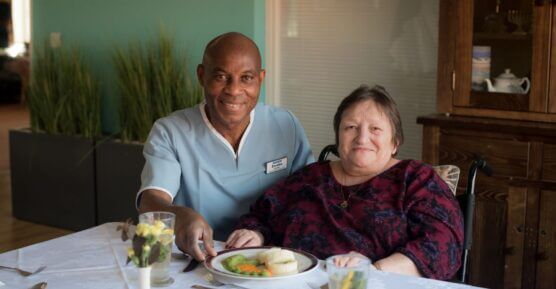
Page contents
Healthy eating in a care home will help you live longer
When it comes to care home food, good nutrition and hydration are key to maintaining an older person’s body and mind. Eating well in a care home can help you live longer. Healthy eating habits and consuming varied, nutritious care home food can reduce the risk of diseases.
Many people who move into care homes have specific dietary needs. You may have food allergies and intolerances that need to be considered. Perhaps you can only eat gluten-free food. You might be vegan, vegetarian or follow religious guidelines e.g. only eat kosher or halal food.
How can I ensure care home food is nutritious?
Care homes should offer you food that takes into account your needs, preferences, allergies and cultural and religious backgrounds. This fulfils the requirements of care regulators. If you have specific dietary needs, your care home should meet these needs.
Although good nutrition and hydration are important at any age, the risk of chronic conditions such as heart disease, cancer and dementia increase as you get older.
In the UK, general dietary guidelines and recommendations for fat, carbohydrate and fibre are unchanged as people age. But, as people get older, energy requirements fall due to basal metabolic rate (the number of calories required to keep the body functioning at rest) and a decrease in physical activity.
Why do older people eat less?
Many older people have a reduced appetite, partly due to a reduced sense of taste and smell, and some find they are unable to eat as much as they used to. Also, the body’s ability to digest, absorb and use vitamins and minerals decreases with age.
Dietary guidelines may be same for all ages, but it is recommended that older people take vitamin D supplements. This is because at old age, people tend to go outdoors less, and their skin does not produce vitamin D from sunlight as well as younger people.
Good nutrition is important as you become more susceptible to age-related conditions. Healthy eating in a care home helps protect oral and dental health, as well as bone and joint health.
How does poor nutrition affect older people?
An insufficient amount of nutrients and calories can result in a variety of health problems. Poor nutrition could result in heart problems, lead to type 2 diabetes, weaken bones and muscles and as well lead to some types of cancer. By ensuring a healthy intake, you can reduce the risk of falling ill at old age.
The immune system is the body’s defence system. If your immune system weakens, you are more susceptible to infections. The immune system becomes less effective when it lacks certain vitamins and minerals, which can increase the risk of an infection. As people age, the immune system gradually declines and takes longer to react to threats. This results in more damage being done before your body is able to launch a response.
Poor eating habits can result in malnutrition. This is linked to longer recovery times from illness, increased infection, admittance to hospital, long-term ill health and an increased risk of disease.
Why is being overweight bad for you?
Excess bodyweight also poses risks, including cardiovascular disease, stroke, cancer and type 2 diabetes.
High blood pressure has been linked to high intakes of salt, fat, energy and alcohol. This puts people at risk of cognitive decline and stroke, which can have serious impact on your health.
Cardiovascular disease, including coronary heart disease and stroke are some of the leading causes of death in the UK. People whose diets are energy-dense, high in saturated fatty acids and salt while being low in dietary fibre, wholegrains and fruit and vegetables usually have a higher risk of developing cardiovascular disease and other chronic diseases.
Many older people are likely to suffer from osteoporosis. This is a health condition that weakens bones, making them fragile and more likely to break. Ensuring a good intake of calcium and vitamin D can help protect your bones.
Too much sugar can result in the development of tooth decay. This can cause pain, infection and tooth loss.
What should you eat when you get older?
To stay as healthy as possible when you get older and minimise the risk of malnourishment and diseases, it is important to ensure you eat care home food that is varied and benefits each part of your body.
Fruit and vegetables
Eating plenty of fruit and vegetables reduces the risk of developing heart diseases, stroke and certain cancers. The UK 5 a Day campaign is based on advice from the World Health Organization which recommends a minimum of 400g of fruit and vegetables a day – a great way to benefit your overall health.
Fruit and vegetables are a great source of vitamins and minerals, including folate, vitamin C and potassium. They also contain dietary fibre, which helps you maintain a healthy gut and can prevent constipation, digestion problems and reduce the risk of bowel cancer.
Different fruit and vegetables contain different combinations of nutrients, so your 5 a Day should include a good variety and ideally be of different colour. Fresh, frozen or canned fruit and vegetables all contribute to your well-being.
Protein
Healthy eating in a care home requires a daily intake of protein. This helps a person aged 65+ maintain and preserve their body’s muscle mass and strength as well as repair itself after injury or surgery. Research show that older people need a higher intake of protein as ageing bodies process protein less efficiently.
According to UK charity Vegetarian for Life, if you are aged 65+, you should eat 1-1.2g of protein per kilogram of body weight each day. For example, if you weigh 64kg (about 10 stone), you should consume an average of 64–77g of protein per day.
Foods that contain protein come from both animal and plant sources. This includes beans, pulses, meat, eggs, fish, tofu, chicken and peas.
Fat
Choosing the right fats helps protect your heart.
To lower your cholesterol level, replace saturated fats and animal fats (found in butter, cream, fat on meat, burgers, sausages etc.) with monounsaturated fats. Monounsaturated fats can be found in olive oil, rapeseed oil, unsalted peanuts, cashew nuts and almonds.
Polyunsaturated fats, such as omega-3 fatty acids, found in oily fish, has been shown to help the protect against heart disease and may help relieve symptoms of rheumatoid arthritis, benefit joints, grip strength and mobility. Polyunsaturated fats are also found in sunflower oil, sesame oil, flaxseed oil, walnuts and hazelnuts.
Starchy food
Starchy foods (such as potatoes, bread, rice and pasta) are important for a healthy diet and are the main source of carbohydrates. They provide your body with energy and a variety of nutrients including fibre, calcium, iron and B vitamins. Potato skin is particularly rich in fibre.
Wholegrain versions of starchy foods contain extra fibre which helps with digestion and can help reduce the amount of cholesterol in your blood.
Dairy
Dairy products are a source of calcium to help keep your bones strong and also provide your body with protein and vitamins. Choosing low-fat varieties of dairy can help you maintain a healthy weight and keep your cholesterol levels in check.
There are a number of plant-based alternatives to dairy, including soya milk and other vegan versions of dairy products.
Fortified food & functional food
To ensure a good intake of nutrients and vitamins at old age despite a reduction in appetite and the fact that older people eat less than younger people, you can consume fortified and functional foods.
Fortified food has added nutrients to increase the intake without increasing the amount of food. Enriching the calorie and protein content of food and drink can help you to avoid unintentional weight loss. Such foods can include breakfast cereals with added vitamins and minerals, such as iron, B vitamins and calcium.
Functional foods include probiotic drinks and yogurts as well as foods with added fibres, cholesterol-lowering spreads and soya with products beneficial for heart health.


